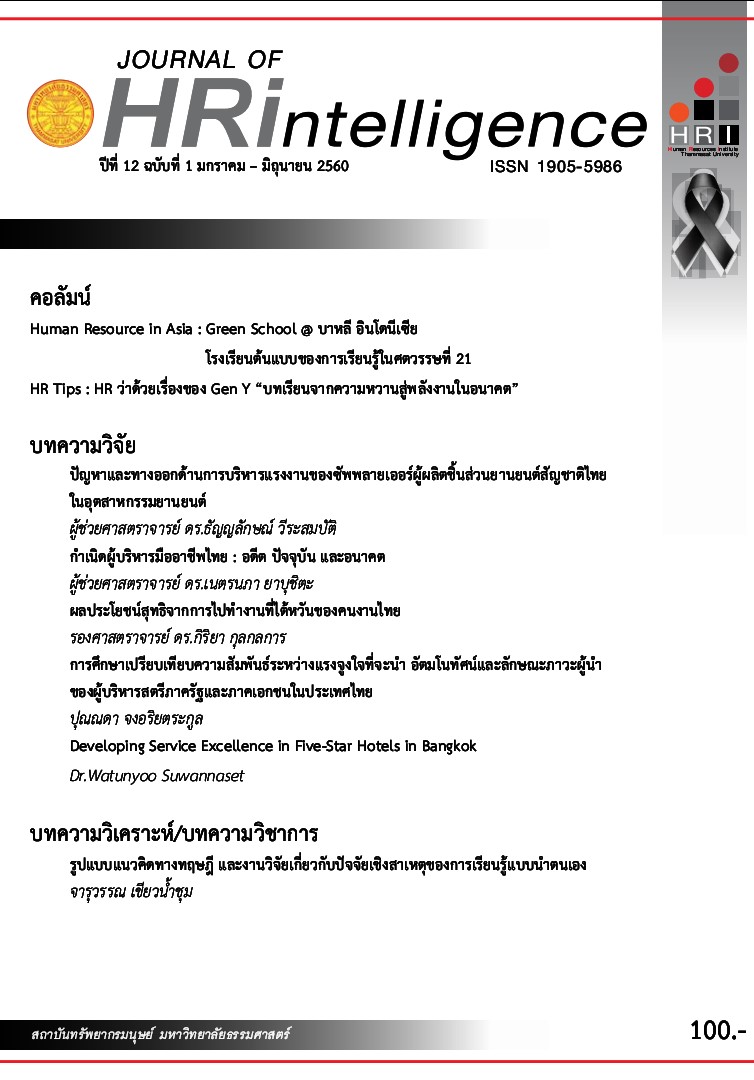The Comparative Study of Relationship between Motivation to Lead, Self-Concept and Leadership Style of Women in Management in Public and Private Sectors Management in Thailand
Main Article Content
Abstract
The purpose of this research is to study relationship between motivation to lead, self-concept, and leadership style of women in management in both public and private sector in Thailand. This research focuses on development of women in management applying a transformational leadership style. This quantitative research used questionnaires to collect data from a sample of 400 people. This research used Stepwise Multiple Regression for studying motivation to lead and self-concept affecting leadership style of women in management in both public and private sector in Thailand. The results show that the study of relationship between motivation to lead and self-concept affecting transformational leadership style of women in management in both public and private sector can be used to create model for developing women in management in both public and private sector. For public sector, the study found that women attitude of self-conception is impacted by affective identity which is one type of motivation to lead and women’s transformational leadership style is dependent with women attitude of self-concept at significant level of 0.05. For private sector, women’s transformational leadership style dependent on women attitude of self-concept and also women’s self-image and both of these factors are influenced by affective identity part of motivation to lead at significant level of 0.05. The results from this research can be used to guide all level of women in management to improve motivation to lead, self-concept, and leadership style for increasing confidence and improving potential for being successful women in management.
Article Details
ขอมอบลิขสิทธิ์บทความที่ได้รับการตีพิมพ์ให้แก่สถาบันเสริมศึกษาและทรัพยากรมนุษย์ กรณีมีการฟ้องร้องเรื่องการละเมิดลิขสิทธิ์เกี่ยวกับภาพ กราฟ ข้อความส่วนใดส่วนหนึ่ง และ/หรือข้อคิดเห็นที่ปรากฎในบทความ ให้เป็นความรับผิดชอบของข้าพเจ้าและผู้เขียนร่วมแต่เพียงผู้เดียว
References
ธีรนุช สุมขุนทด. (2555). ภาวะผู้นำของผู้บังคับบัญชาหญิงและเจคติของพนักงานต่อผู้บังคับบัญชาหญิงที่พยากรณ์ผลการปฏิบัติงานของพนักงานมหาวิทยาลัยสายสนับสนุน มหาวิทยาลัยเทคโนโลยีพระจอมเกล้าพระนครเหนือ. นนทบุรี : มหาวิทยาลัยเทคโนโลยีพระจอมเกล้าพระนครเหนือ.
ปองฤทัย วิจิตรโท. (2553). ทัศนคติของพนักงานบริษัท ท่าอากาศยานไทย จำกัด (มหาชน) ที่มีต่อหัวหน้างานที่เป็นผู้หญิง. กรุงเทพมหานคร : จุฬาลงกรณ์มหาวิทยาลัย.
พสุ เดชะรินทร์. (2555). แนวคิดการบริหาร. หนังสือพิมพ์ผู้จัดการ 360 องศา รายสัปดาห์.
พิรญาณ์ บุญญสถิต. (2552). ทัศนคติของผู้ใต้บังคับบัญชาต่อผู้บังคับบัญชาที่เป็นสตรี. กรุงเทพมหานคร: จุฬาลงกรณ์มหาวิทยาลัย.
ภคพร ภู่ไพบูลย์. (2554). ความสัมพันธ์ระหว่างภาวะผู้นำเชิงปฏิรูป การรับรู้การสนับสนุนจากองค์การและความพึงพอใจในงาน. กรุงเทพมหานคร : มหาวิทยาลัยธรรมศาสตร์.
วีระวัฒน์ ปันนิตามัย. (2550). การศึกษาเปรียบเทียบสมรรถนะของภาวะผู้นำการเปลี่ยนแปลง แรงจูงใจที่จะนำ และการต่อต้านการเปลี่ยนแปลงของนักศึกษาหลักสูตรภาคพิเศษ. กรุงเทพมหานคร : คณะรัฐประศาสนศาสตร์ สถานบันบัณฑิตพัฒนบริหารศาสตร์.
ศาลิตา ทับพุ่ม. (2550). เงื่อนไขและปัจจัยที่เอื้อและไม่เอื้อต่อการพัฒนาภาวะผู้นำในสตรี กรณีศึกษากลุ่มอนุรักษ์
ทรัพยากรธรรมชาติและสิ่งแวดล้อมชุมชนบ้านละหอกกระสัง จังหวัดบุรีรัมย์. กรุงเทพมหานคร: มหาวิทยาลัยมหิดล.
สวรุส นภวงศ์ ณ อยุธยา. (2547). การทำนายผลการปฏิบัติงานของผู้ตามโดยการประเมินความเป็นผู้นำนักปฏิรูปและความเป็นผู้นำนักแลกเปลี่ยน. กรุงเทพมหานคร : จุฬาลงกรณ์มหาวิทยาลัย.
เสาวลักษณ์ โสมะทัต. (2553). ความสัมพันธ์ระหว่างภาวะผู้นำการเปลี่ยนแปลงของผู้บริหารสตรีกับประสิทธิผลของโรงเรียนในสังกัดสำนักงานเขตพื้นที่การศึกษาชลบุรี เขต 1. ชลบุรี : มหาวิทยาลัยบูรพา.
อารีย์ กองแก้ว. (2555). การรับรู้และความคาดหวังของครูผู้สอนต่อคุณลักษณะภาวะผู้นำอันพึงประสงค์ของผู้บริหารสถานศึกษา.เชียงราย : มหาวิทยาลัยแม่ฟ้าหลวง.
Alice H. Eagly, Mary C. Johannesen-Schmidt & Marloes L. van Engen. (2000). Transformational, Transactional, and Laissez-Faire Leadership Styles : A Meta-Analysis Comparing Women and Men. Journal of Applied Psychology Vol. 129, No. 4, 569–591.
Ashley A. Miller. (2011). Examining the effects of leadership style on the follower's self-concept. East Carolina : East Carolina University.
Bass B. M. (1985). Leadership and Performance. New York : Free Press.
Bower M. (1966). The Will to Manage. New York : McGraw-Hill.
Burns J. M. (1978). Leadership. New York : Harper & Row.
Burns R. B. (1979). The self-concept : Theory, measurement, development and behavior. New York : Longman.
Chan K. & Drasgow F. (2003). Toward a theory of individual differences and leadership : Understanding the motivation to lead. Journal of Applied Psychology, 481-498.
Cochran W. (1977). Sampling Techniques 3d ed. New York: John Wiley and Sons Inc.
Combs A. W. & Snygg D. (1959). Individual behavior. New Yirk : Harper and Row.
Dong Fang Wang. (2010). The Correlation of Ledership Style to Leader Self-Concept. Arizona : Univercity of Phoenix.
Kotter J. P. (1990). A Force for Change: How Leadership Differs from Management. New York : Free Press.
Lussier R. N. & Achua C. F. (2007). Effective Leadership. Ohio : Thomson.
McClelland D. C. (1961). The Achieving Society. Princeton: N.J. Van Nostrand.
McClelland D. C. & Boyatzis R. (1982). Leadership motive pattern and long-term success in Management. Journal of Applied Psychology, 67, 737-743.
Miner J. B. (1978). Twenty years of research on role motivation theory of managerial effectiveness : Personnel Psychology. New York : McGraw-Hill.
Rogers C. R. (1951). Client-centered therapy. Boston : Haughton Mifflin.
Spencer L. M. & Spencer S. M. (1993). Competence at work : Models for superior performance. New York : John Wiley & Sons, Inc.
The Grant Thornton International Business. (2013). More women making it into senior management roles - but mature economies lagging behind. Retrieved 24 February 2014, from http://www.internationalbusinessreport.com/press-room/2013/women.asp.
Wanida Phondej. (2010). The Conditions and Factors Associated with Successful Female Leadership in Thailand : a Conceptual Framework. The Conditions and Factors Associated with Successful. Dhurakijpundit University, DPU International College, Thailand, Volume 11, Issue 1, March 2010.
Wylie R. C. (1961). The self-concept: A critical survey of pertinent research literature. Lincoln, NE : University of Nebraska Press.


